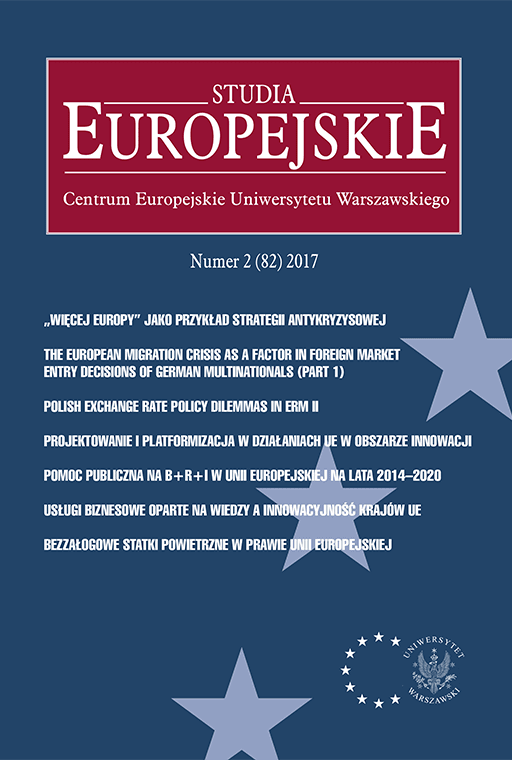
ISSUE: 2/2017
- Volume 82
- Number 2
- 2017
Subscribe NEWSLETTER
Studia Europejskie –
Studies in European Affairs
ISSN: 1428-149X
e-ISSN: 2719-3780
License
Articles published in the journal are under a Creative Commons Attribution – Non Commercial – No Derivatives 4.0 International License
Usługi biznesowe oparte na wiedzy a innowacyjność krajów Unii Europejskiej
Knowledge-intensive Business Services and the Innovativeness of European Union Countries
Abstract
The aim of this article is to study and compare the importance of intermediate demand for KIBS and to examine the relation between KIBS intensity and innovativeness in the EU countries. The study refers to all the EU countries, which gives an opportunity of comparative analysis between countries, in particular between EU-15 and EU-12. The data are derived from the World Input-Output Database (WIOD) and the European Innovation Scoreboard. The analyzed period covers the years 2000–2014 (with respect to KIBS intensity), and 2002–2014 (with respect to innovativeness), which is determined by the availability of relevant data.
The empirical study shows that among the EU-15 countries only those with high income can be characterized by a higher level of KIBS intensity and innovativeness than the EU-12 countries. The statistical research shows that there is a positive, statistically signifi cant correlation between KIBS intensity in the economy and its innovativeness, measured by the Summary Innovation Index.
References
Barras R., Towards a Theory of Innovation in Services, “Research Policy”, nr 15/4/1986.
Bilderbeek R., Hertog den P., Marklund G., Miles I., Services in Innovation: Knowledge Intensive Business Services (KIBS) As Co-Producers of Innovation, “SI4S Synthesis Paper”, S3/1998.
EIS 2016 database, European Commission 2016, http://ec.europa.eu/growth/industry/innovation/facts-figures/scoreboards_pl (dostęp 15.09.2016).
European Innovation Scoreboard 2006. Comparative Analysis of Innovation Performance, INNO-Metrics, European Commission 2006, https://www.berlin-partner.de/…/2006/INNO-Metrics%20-%20Eur (dostęp 15.09.2016).
Eurostat indicators of High-tech industry and Knowledge – intensive services, Annex 3 – High-tech aggregation by NACE Rev.2, Eurostat 2015, http://ec.europa.eu/eurostat/cache/metadata/Annexes/htec_esms_an3.pdf (dostęp 23.01.2015).
Evangelista R., Sectoral Patterns of Technological Change in Services, “Economics of Innovation and New Technology”, No 9/3/2000.
Evangelista R., Savona M., Innovation, employment and skills in services.
Firm and sectoral evidence, „Structural Change and Economic Dynamics”, No. 14/4/2003.
Gershuny J.I., Miles I.D., The New Service Economy, the Transformation of Employment in Industrial Societies, Pinter Publishers, London 1983.
Hertog den P., Co-producers of innovation: on the role of knowledge-intensive services in innovation, w: Productivity, Innovation and Knowledge in Services: New Economic and Socio-Economic Approaches, red. J. Gadrey, F. Gallouj, Edward Elgar Publishing, Cheltenham (UK)-Northampton (USA) 2002.
Hollanders H., European Innovation Scoreboard (EIS): Evolution and Lessons Learnt, paper presented at Innovation Indicators for Latin America Workshop, OECD 2009, https://www.oecd.org/dev/americas/42468972.pdf (dostęp 15.09.2016).
Kanerva M., Hollanders H., Arundel A., European Innovation Scoreboard – Can We Measure and Compare Innovation in Services?, European Commission, Bruksela 2006.
Miles I., Kastrinos N., Flanagan K., Bilderbeek R., Den Hertog P., Huntink W., Bouman M., Knowledge-intensive business services: users, carriers and sources of innovation, “EIMS Publication”, 15/1995, https://research.mbs.ac.uk/INNOVATION/Portals/0/docs/KIBSEIMS1995shortreport.pdf (dostęp 7.09.2014).
Miozzo M., Soete L., Internationalization of services: a technological perspective, “Technological Forecasting and Social Change”, nr 67/4/2001.
National Supply and Use Tables, WIOD database 2013, www.wiod.org (dostęp 5.11.2013).
National Supply and Use Tables, WIOD database 2016, www.wiod.org (dostęp 9.12.2016).
Pavitt K., Sectoral patterns of technical change: towards a taxonomy and a theory, “Research Policy”, nr 13/6/1984.
Pułaska-Turyna B., Statystyka dla ekonomistów, Difin, Warszawa 2005.
Results of the community innovation survey 2012, Science, technology and innovation, Eurostat 2012, epp.eurostat.ec.europa.eu/portal/page/portal/statistics/themes (dostęp 3.09.2012).
Salter A., Tether B.S., Innovation in Services, Through the Looking Glass of Innovation Studies, Advanced Institute of Management Research’s Grand Challenge on Service Science 2006.
Schnabl E., Zenker A., Statistical Classifi cation of Knowledge-Intensive Business Services (KIBS) with NACE Rev.2, “evoREG Research”, Note #25/2013.
Tether B.S., Miles I., Blind K., Hipp C., Liso de N., Cainelli G., Innovation in Services. An Analysis of CIS-2 data on Innovation in the Service Sector, A report for the European Commission 2002, www.cric.ac.uk/cric/pdfs/wp11.pdf (dostęp 6.05.2012).
Wyszkowska-Kuna J., Innovation in services – theoretical approach, “Comparative Economic Research”, nr 18/4/2011.
Wyszkowska-Kuna J., Przyczyny mniejszej aktywności fi rm usługowych w obszarze działalności innowacyjnej, w: Gospodarka w okresie kryzysu globalnego, red. E. Kwiatkowski, W. Kasperkiewicz, „Acta Universitatis Lodziensis. Folia Oeconomica”, nr 281/2013.
Wyszkowska-Kuna J., Usługi biznesowe oparte na wiedzy. Wpływ na konkurencyjność gospodarki na przykładzie wybranych krajów Unii Europejskiej, Wydawnictwo Uniwersytetu Łódzkiego 2016.
Wyszkowska-Kuna J., Financial services input as a source of economic growth in the European Union countries, “Przegląd Statystyczny”, nr 63/3/2016b.
Language: Polish
Pages: 119-136
How to Cite:
Harvard
Wyszkowska-Kuna, J. (2017) "Usługi biznesowe oparte na wiedzy a innowacyjność krajów Unii Europejskiej". Studia Europejskie – Studies in European Affairs, 2/2017, pp. 119-136.